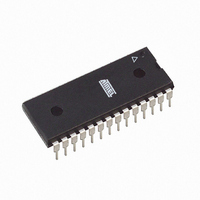ATMEGA8A-PU Atmel, ATMEGA8A-PU Datasheet - Page 231

ATMEGA8A-PU
Manufacturer Part Number
ATMEGA8A-PU
Description
MCU AVR 8K FLASH 16MHZ 28-PDIP
Manufacturer
Atmel
Series
AVR® ATmegar
Specifications of ATMEGA8A-PU
Core Processor
AVR
Core Size
8-Bit
Speed
16MHz
Connectivity
I²C, SPI, UART/USART
Peripherals
Brown-out Detect/Reset, POR, PWM, WDT
Number Of I /o
23
Program Memory Size
8KB (4K x 16)
Program Memory Type
FLASH
Eeprom Size
512 x 8
Ram Size
1K x 8
Voltage - Supply (vcc/vdd)
2.7 V ~ 5.5 V
Data Converters
A/D 6x10b
Oscillator Type
Internal
Operating Temperature
-40°C ~ 85°C
Package / Case
28-DIP (0.300", 7.62mm)
Processor Series
ATMEGA8x
Core
AVR8
Data Bus Width
8 bit
Data Ram Size
1 KB
Interface Type
SPI, TWI, USART
Maximum Clock Frequency
16 MHz
Number Of Programmable I/os
23
Number Of Timers
3
Maximum Operating Temperature
+ 85 C
Mounting Style
Through Hole
3rd Party Development Tools
EWAVR, EWAVR-BL
Development Tools By Supplier
ATAVRDRAGON, ATSTK500, ATSTK600, ATAVRISP2, ATAVRONEKIT
Minimum Operating Temperature
- 40 C
On-chip Adc
10 bit, 6 Channel
Package
28PDIP
Device Core
AVR
Family Name
ATmega
Maximum Speed
16 MHz
Operating Supply Voltage
3.3|5 V
Controller Family/series
AVR MEGA
No. Of I/o's
23
Eeprom Memory Size
512Byte
Ram Memory Size
1KB
Cpu Speed
16MHz
Rohs Compliant
Yes
For Use With
ATSTK600 - DEV KIT FOR AVR/AVR32ATSTK500 - PROGRAMMER AVR STARTER KIT
Lead Free Status / RoHS Status
Lead free / RoHS Compliant
Available stocks
Company
Part Number
Manufacturer
Quantity
Price
Part Number:
ATMEGA8A-PU
Manufacturer:
ATMEL/爱特梅尔
Quantity:
20 000
- Current page: 231 of 308
- Download datasheet (6Mb)
24.7
24.7.1
24.7.2
8159D–AVR–02/11
Parallel Programming
Enter Programming Mode
Considerations for Efficient Programming
Table 24-10. Command Byte Bit Coding
The following algorithm puts the device in Parallel Programming mode:
Note, if the RESET pin is disabled by programming the RSTDISBL Fuse, it may not be possible
to follow the proposed algorithm above. The same may apply when External Crystal or External
RC configuration is selected because it is not possible to apply qualified XTAL1 pulses. In such
cases, the following algorithm should be followed:
The loaded command and address are retained in the device during programming. For efficient
programming, the following should be considered.
1. Apply 4.5 - 5.5V between V
2. Set RESET to “0” and toggle XTAL1 at least 6 times
3. Set the Prog_enable pins listed in
4. Apply 11.5 - 12.5V to RESET. Any activity on Prog_enable pins within 100ns after +12V
1. Set Prog_enable pins listed in
2. Apply 4.5 - 5.5V between V
3. Wait 100 ns.
4. Re-program the fuses to ensure that External Clock is selected as clock source
5. Exit Programming mode by power the device down or by bringing RESET pin to 0’b0.
6. Entering Programming mode with the original algorithm, as described above.
• The command needs only be loaded once when writing or reading multiple memory
• Skip writing the data value 0xFF, that is the contents of the entire EEPROM (unless the
• Address High byte needs only be loaded before programming or reading a new 256 word
locations.
EESAVE Fuse is programmed) and Flash after a Chip Erase.
window in Flash or 256byte EEPROM. This consideration also applies to Signature bytes
reading.
100 ns.
has been applied to RESET, will cause the device to fail entering Programming mode.
RESET.
(CKSEL3:0 = 0’b0000) and RESET pin is activated (RSTDISBL unprogrammed). If
Lock Bits are programmed, a chip erase command must be executed before changing
the fuses.
Command Byte
0000 1000
0000 0100
0000 0010
0000 0011
Command Executed
Read Signature Bytes and Calibration byte
Read Fuse and Lock Bits
Read Flash
Read EEPROM
CC
CC
and GND, and wait at least 100µs.
and GND simultaneously as 11.5 - 12.5V is applied to
Table 24-8 on page 230
Table 24-8 on page 230
to “0000”.
to “0000” and wait at least
ATmega8A
231
Related parts for ATMEGA8A-PU
Image
Part Number
Description
Manufacturer
Datasheet
Request
R

Part Number:
Description:
IC AVR MCU 8K 16MHZ 5V 32TQFP
Manufacturer:
Atmel
Datasheet:

Part Number:
Description:
IC AVR MCU 8K 16MHZ 5V 32-QFN
Manufacturer:
Atmel
Datasheet:

Part Number:
Description:
IC AVR MCU 8K 16MHZ 5V 28DIP
Manufacturer:
Atmel
Datasheet:

Part Number:
Description:
IC AVR MCU 8K 16MHZ COM 32-TQFP
Manufacturer:
Atmel
Datasheet:

Part Number:
Description:
IC AVR MCU 8K 16MHZ IND 32-TQFP
Manufacturer:
Atmel
Datasheet:

Part Number:
Description:
IC AVR MCU 8K 16MHZ COM 28-DIP
Manufacturer:
Atmel
Datasheet:

Part Number:
Description:
IC AVR MCU 8K 16MHZ IND 28-DIP
Manufacturer:
Atmel
Datasheet:

Part Number:
Description:
IC AVR MCU 8K 16MHZ COM 32-QFN
Manufacturer:
Atmel
Datasheet:

Part Number:
Description:
MCU AVR 8KB FLASH 16MHZ 32QFN
Manufacturer:
Atmel
Datasheet:

Part Number:
Description:
IC AVR MCU 8K 16MHZ IND 32-QFN
Manufacturer:
Atmel
Datasheet:

Part Number:
Description:
IC MCU AVR 8K 5V 16MHZ 32-TQFP
Manufacturer:
Atmel
Datasheet:

Part Number:
Description:
IC MCU AVR 8K 5V 16MHZ 32-QFN
Manufacturer:
Atmel
Datasheet:

Part Number:
Description:
IC MCU AVR 8K 5V 16MHZ 28-DIP
Manufacturer:
Atmel
Datasheet:












